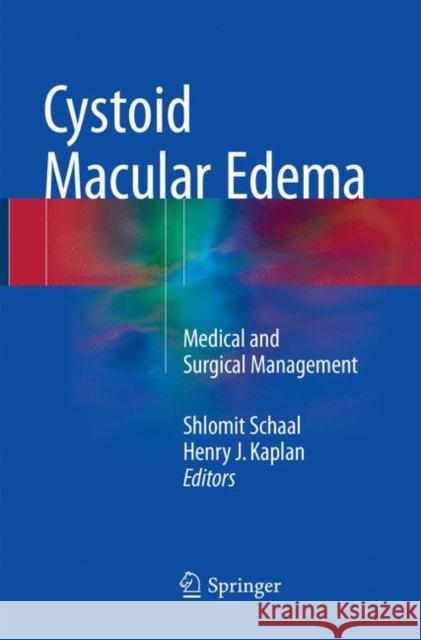


ISBN-13: 9783319819617 / Angielski / Miękka / 2018 / 239 str.
ISBN-13: 9783319819617 / Angielski / Miękka / 2018 / 239 str.
PATHOPHYSIOLOGY AND DIAGNOSIS OF CME: Introduction.- Pathophysiology of CME.- Diagnosis of CME (Imaging). MEDICAL MANAGEMENT OF CME: CME Associated with Uveitis.- CME Associated with Diabetes.- CME Associated with Vitreo-Retinal Interface.- CME Associated with Retinal Vascular Occlusions.- Retained Lens Fragments in Lens Induced CME. SURGICAL MANAGEMENT OF CME: CME Associated with Uveitis.- CME Associated with Diabetes.- CME Associated with Vitreo-Retinal Interface.- CME Associated with Retinal Vascular Occlusions.- Lens Induced CME. Conclusion and Outlook Towards the Future.
Shlomit Schaal, MD, PhD, is a Professor of Ophthalmology and the Chair of the Department of Ophthalmology & Visual Sciences at the University of Massachusetts School of Medicine, Worcester, MA, USA. Dr. Schaal is a clinician-scientist specializing in the cutting-edge medical and surgical treatment of complex vitreoretinal diseases. She earned her undergraduate, medical and doctoral degrees from Technion Institute of Technology in Israel, graduating as the valedictorian of both her undergraduate and medical school classes, before going on to an ophthalmology residency at Israel’s Rambam Medical Center and fellowships in Vitreoretinal Research and Vitreoretinal Surgery at the University of Louisville. She served on the faculty of the University of Louisville as the Director of Retina, and the Director of Vitreo-Retinal Fellowship, before being appointed as the Chair of Ophthalmology at the University of Massachusetts. Dr. Schaal actively serves on the Program Committee of the American Academy of Ophthalmology (AAO), the Translational Science Working Group, and the Professional Development and Education Committee for the Association for Research in Vision and Ophthalmology (ARVO). Dr. Schaal is an author of more than 60 peer-reviewed scientific manuscripts, and has received numerous awards, including the American Academy of Ophthalmology Achievement Award, The American Society of Retina Specialists Senior Honor Award, the MOSAIC Award and the ARVO/Alcon Clinician-Scientist Research Award.
Henry J. Kaplan, MD, is the Evans Professor of Ophthalmology, Chair of the Department of Ophthalmology & Visual Sciences, and Director of the Kentucky Lion’s Eye Center at the University of Louisville. He has an associate appointment in the Department of Microbiology and Immunology. Dr. Kaplan is a vitreoretinal surgeon with expertise in age-related macular degeneration, diabetic retinopathy, hereditary retinal degeneration, and uveitis. Dr. Kaplan received his bachelor’s degree from Columbia University (NYC) and his medical degree from Cornell (NYC). He served his residency in ophthalmology at the University of Iowa Hospitals and Clinics (Iowa City, IA), and his retina-vitreous fellowship at the Medical College of Wisconsin–Milwaukee. He was previously on the faculty of Emory University (Atlanta, GA, 1979-1988), where he served as Director of Eye Research, and Washington University (St. Louis, MO, 1988-200), where he served as Chair of the Department of Ophthalmology from 1988 to 1998. Dr. Kaplan has published almost 300 articles in scholarly journals. Among his accolades are the Alcon Research Institute’s Scientific Award and the editorship of the Journal of Ocular Immunology and Inflammation. He is a past president of the Uveitis Society and a fellow of the American College of Surgeons (FACS) and the Association for Research in Ophthalmology (FARVO).
Drs. Schaal and Kaplan have delivered a series of scientific educational courses focused on the medical and surgical management of cystoid macular edema at international conferences, such as the American Academy of Ophthalmology (AAO), World Ophthalmology Congress (WOC), and the American Society of Retina Specialists (ASRS).
Written for comprehensive ophthalmologists and vitreoretinal surgeons, this book discusses state-of-the-art medical and surgical management of cystoid macular edema (CME) and explains the current understanding of the pathophysiology of the condition and methods of diagnosis. The management approach is clearly detailed for each potential presentation, including CME occurring in association with uveitis, diabetes mellitus, vitreoretinal interface changes, retinal vascular occlusions, and lens-induced pathology. The guidance takes full account of the continued expansion in medical treatment options due to the development of new drugs and the increased availability of minimally invasive surgical procedures. Additionally, since therapeutic approaches to CME depend on a clear understanding of pathophysiologic mechanisms and the structural changes in the vitreous and neurosensory retina revealed by imaging studies, these aspects are carefully considered as well.
1997-2026 DolnySlask.com Agencja Internetowa







